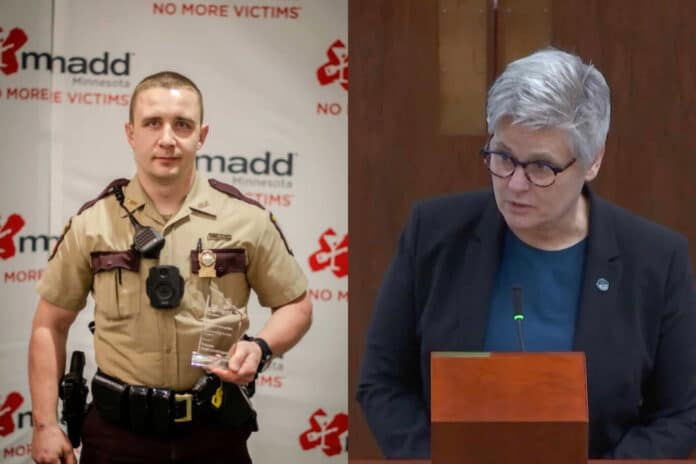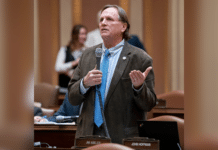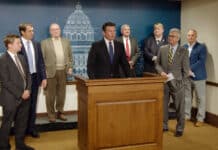
Last month, Hennepin County Attorney Mary Moriarty dropped all criminal charges against Minnesota State Trooper Ryan Londregan. Despite the dismissal of those charges, the Hennepin County Attorney’s Office (HCAO) and Londregan’s defense team are still filing motions opposing one another in the closed case.
In January, Moriarty brought three felony charges against Trooper Londregan, including second-degree unintentional murder. The charges were connected to a July 2023 incident that resulted in the death of Ricky Cobb II.
Moriarty’s decision to charge Londregan, and her office’s handling of the case, have been roundly criticized by law enforcement groups, elected officials, and many Minnesotans. At the beginning of June, Moriarty officially dropped all the charges against Londregan, but the legal fight between Moriarty and Londregan’s defense team has continued.
On June 28, the HCAO filed a motion asking the court to release the entire transcript of the grand jury proceedings from the Londregan case. Additionally, the state asked that a sealed declaration from a law enforcement official be released as well. In their requests, the HCAO effectively said the documents should be released because the release of the documents could no longer influence a case that has been dismissed.
However, Londregan’s defense team submitted their own motion in which they said Londregan “agrees that these materials should be made available to the public — provided that the full record, not just those portions selected by the HCAO — can be disclosed.” In turn, Londregan’s team asked the court to give Londregan and his attorneys all the materials produced during the case’s discovery process.
Londregan is currently facing a civil case which was filed by the family of Ricky Cobb II. In short, Londregan’s team says the state trooper requires the discovery materials from his dismissed criminal case to mount his defense in the civil case.
HCAO responded with a memo imploring the court to grant their motions and reject Londregan’s motions. According to the HCAO, the Minnesota Bureau of Criminal Apprehension (BCA) will release all investigative data related to the now-inactive criminal case. That data will contain redactions of materials that are protected in accordance with the Minnesota Government Data Practices Act (MGDPA).
The HCAO said they oppose the court’s release of all discovery materials to Londregan because doing so would give Londregan the unredacted versions of those materials. HCAO argued that the release of the unredacted data could lead to identification of undercover law enforcement personnel and public disclosure of nonpublic medical examiner data.
In writing to the court, the HCAO described Londregan’s request as “overly broad and unnecessary given the forthcoming release of the case file by the BCA, which will comply with the MGDPA.”
Responding with a memo of their own, Londregan’s defense team blasted the HCAO and their attempt to discredit Londregan’s request for information regarding his own case.
“Justice Brandeis famously noted that ‘Sunshine is the best disinfectant,’ and relatedly
here, the Bible aptly states that ‘the truth shall set you free.’ Trooper Londregan supports the notion to permit the sun to shine on literally everything in this case — but not the cherry-picked, dishonest narrative that the HCAO has unsuccessfully peddled since January 2024. Accordingly, if the HCAO is truly interested in the truth, then let the truth reign free. Release everything without restriction.”
Londregan’s team proceeded to explain that they are only in favor of the court granting the HCAO’s motion if Londregan’s motion is granted as well. Should this occur, Londregan would receive all the materials produced during the case’s discovery process, and the HCAO’s request for release of the grand jury transcript and the sealed law enforcement declaration would be granted.
In their memo, Londregan’s team also accused Moriarty of wanting to release the grand jury proceedings to allow for publication of a report that smears Trooper Londregan.
The 60-page report Londregan’s team refers to is a document put together by lawyers with the Washington, D.C. law firm known as Steptoe. Hired by Moriarty to work on the case against Londregan, the Steptoe firm’s so-called “Steptoe Report” contains detailed information about how the case developed. While an executive summary of the document has been publicly released, the full report has not.
According to Londregan’s attorneys, the Steptoe Report “purportedly (1) accuses Trooper Londregan of improper conduct despite admitting that no charges could be sustained and there is no evidence of any violation of training or policy and (2) advocates for various policy changes and political objectives…”
At a June press conference discussing the dismissed charges and the Steptoe Report, Moriarty said she hoped to get a court order releasing the information regarding the grand-jury proceedings, thus allowing for the release of the full Steptoe Report.
As such, the Londregan memo says “the HCAO seeks the court’s blessing to release its unlawfully obtained grand-jury materials so that it can also publicize an apparent, undisclosed 60-page report based on those grand-jury materials that it commissioned from privately-paid attorneys to attempt to retroactively justify the HCAO’s misconduct in this case.”
Regarding HCAO’s concerns about sensitive information being released, the Londregan memo said the trooper would accept reasonable restrictions on released data to ensure undercover law enforcement officials are not identified.
Additionally, Londregan’s lawyers said the BCA has failed to release the investigative file of the case in accordance with a prescribed legal deadline. As such, Londregan’s team wrote that it is unfair for “Trooper Londregan to have to wait weeks or months more for the release of the BCA file — especially since the BCA is already tardy.”
District Court Judge Tamara Garcia, the judicial officer overseeing this case, has yet to rule in favor of either party. Ostensibly, the judge could rule entirely in favor of one side. Conversely, Judge Garcia could author an order which fulfills some of the stated requests from one or both sides.

















